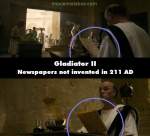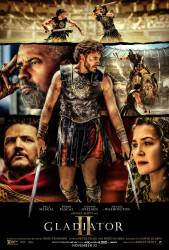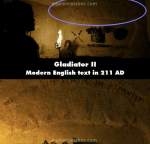
Factual error: After the naval battle, Thraex is waiting for an informant who tips him off about Lucilla and Marcus Acacius's plans. And of course, as a well-educated gentleman of 200 AD, he kills time by reading the newspaper. Wait, what? Needless to say (to anyone but Ridley Scott, probably), ancient Romans wouldn't/couldn't exactly get their news by newspaper, the press having not been invented yet. This one looks so modern in its layout it even has headlines and a proper publication title, "Roma Viridia."
Factual error: The Numidians defend their city against the Roman invaders using also trebuchets - a type of siege equipment that would only appear in the Middle Ages.
Factual error: In the Senate scenes, there are a few women in the council. Women couldn't be senators in Rome. To be fair, none is shown raising their hand when Macrinus asks to vote, so it can be argued that they are perhaps not portrayed to be full-fledged members; however, the simple participation in the most important ruling body of the Empire appears to be anachronistic.
Factual error: In his flashback en route to Rome, young Lucius is shown playing football (soccer) as goalkeeper with his friends in Africa. There is no historic testimony of any ball game in the ancient world with such a close resemblance to modern soccer (exclusive use of feet, rectangular goal, etc.).
Suggested correction: There are a few seconds of kids kicking a ball (coconut) around and a kid guarding two poles. Nothing shows they are actually following the rules of modern soccer. They are not doing an official sport, just a ball game they came up with that happens to look like soccer. There is only one goal too.
It is not an official game, but it's not randomly kicking the ball. It's the way modern kids with a previous knowledge of football would organise. It seems trivial to us, even natural, but as you can see, for instance, on the FIFA website, it is anything but. Games with exclusive use of feet weren't a thing in the Greco-Roman world. What is shown in the movie is meant to resemble something that the modern audience is familiar with, but wasn't at all close to the culture of 2nd century kids in Egypt.
Factual error: While it is true that in ancient Rome naval battles were orchestrated and would occasionally take place in the Colosseum itself, and even that salt water could be used, the logistics of bringing live sharks all the way inland are patently absurd.
Factual error: The movie begins in 200 AD, and the victorious general Acacius celebrates triumph and reports to the twin emperors that he conquered Numidia in their name. This may be less of an accomplishment than it appears when you consider that Numidia had already been a Roman province for centuries.
Factual error: Caracalla and Geta in this movie are decadent mad kings, but that's a portrayal that has no foundation in history - here they look more like their successor Eliogabalus. Caracalla in particular, who was the elder brother, wasn't an effeminate sybarite plagued with syphilis; on the contrary, even by his detractors, he was mostly remembered for being, or at least acting, very soldier-like; "Caracalla" was his nickname, after a military mantle.
Factual error: Much like its predecessor, this movie sorta speedruns through emperors; Geta and Caracalla here are shown as both ruling Rome as "twin emperors" in 200 AD, and die within a couple of days of each other, betrayed by Macrinus, who dies the same day. None of that is anywhere close to how things happened, to the point that discussing dates is sorta pointless; nothing resembles history if not in the loosest sense. Macrinus in this movie is never even formally proclaimed emperor, as opposed to him ruling for at least a full year.






